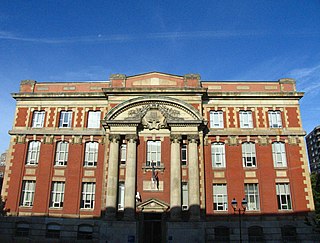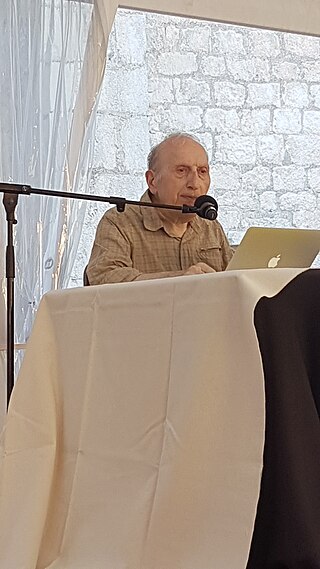Related Research Articles
Joual is an accepted name for the linguistic features of Quebec French that are associated with the French-speaking working class in Montreal which has become a symbol of national identity for some. Joual has historically been stigmatized by some, and celebrated by others. While Joual is often considered a sociolect of the Québécois working class, many feel that perception is outdated, with Joual becoming increasingly present in the arts.

Quebec French, also known as Québécois French, is the predominant variety of the French language spoken in Canada. It is the dominant language of the province of Quebec, used in everyday communication, in education, the media, and government.

The Office québécois de la langue française is a Quebec public provincial organization established on 24 March 1961, by the Liberal government of Jean Lesage. Attached to the Ministère de la Culture et des Communications(Ministry of Culture and Communications), its initial mission, defined in its report of 1 April 1964, was "to align on international French, promote good Canadianisms and fight Anglicisms ... work on the normalization of the language in Quebec and support State intervention to carry out a global language policy that would consider notably the importance of socio-economic motivations in making French the priority language in Quebec".
The Charter of the French Language, also known in English as Bill 101 or Law 101, is a law in the province of Quebec in Canada defining French, the language of the majority of the population, as the official language of the provincial government. It is the central legislative piece in Quebec's language policy, and one of the three statutory documents Quebec society bases its cohesion upon, along with the Quebec Charter of Human Rights and Freedoms and the Civil Code of Quebec. The Charter also protects the Indigenous languages of Quebec.
The politics of Quebec are centred on a provincial government resembling that of the other Canadian provinces, namely a constitutional monarchy and parliamentary democracy. The capital of Quebec is Quebec City, where the Lieutenant Governor, Premier, the legislature, and cabinet reside.
The Official Languages Act is a Canadian law that came into force on September 9, 1969, which gives French and English equal status in the government of Canada. This makes them "official" languages, having preferred status in law over all other languages. Although the Official Languages Act is not the only piece of federal language law, it is the legislative keystone of Canada's official bilingualism. It was substantially amended in 1988. Both languages are equal in Canada's government and in all the services it controls, such as the courts.
This article presents the current language demographics of the Canadian province of Quebec.
Articles related to Quebec include:
Francization or Francisation, also known as Frenchification, is the expansion of French language use—either through willful adoption or coercion—by more and more social groups who had not before used the language as a common means of expression in daily life. As a linguistic concept, known usually as gallicization, it is the practice of modifying foreign words, names, and phrases to make them easier to spell, pronounce, or understand in French.
Anti-Quebec sentiment is a form of prejudice which is expressed toward the government, culture, and/or the francophone people of Quebec. This prejudice must be distinguished from legitimate criticism of Quebec society or the Government of Quebec, though the question of what qualifies as legitimate criticism and mere prejudice is itself controversial. Some critics argue that allegations of Quebec bashing are sometimes used to deflect legitimate criticism of Quebec society, government, or public policies.
Magoua is a particular dialect of basilectal Quebec French spoken in the Trois-Rivières area, between Trois-Rivières and Maskinongé. Long before a military fort was constructed there, Trois-Rivières became in 1615 the first stronghold of the coureurs des bois outside the city of Québec. Magoua is the ethnonym applied to their descendants in the area. Magoua is the most conservative of all Quebec French varieties, including Joual. It preserves the sontaient ("étaient") characteristic of Métis French and Cajun French, has a creole-like past tense particle tà and has old present-tense contraction of a former verb "to be" that behave in the same manner as subject clitics.
The Trésor de la langue française au Québec is a project created in the 1970s with the primary objective of establishing a scientific infrastructure for research into the history of Quebec French and, also, its current usage. The project is affiliated to the Centre interdisciplinaire de recherches sur les activités langagières (CIRAL) at Université Laval.
Charles Castonguay is a retired associate professor of Mathematics and Statistics at the University of Ottawa.
Herbert Marx was a Canadian lawyer, university law professor, politician, and judge. He was a member of the National Assembly of Quebec from 1979 to 1989, a cabinet minister, and a Justice of the Quebec Superior Court.

Jean-Claude Milner is a linguist, philosopher and essayist. His specialist fields of endeavour are linguistics and psychoanalysis. In 1971, Milner was at the Massachusetts Institute of Technology where he translated Noam Chomsky's Aspects of the Theory of Syntax into French. His work helped to establish the terminology of theory of syntax in the French school of generative grammar. Milner is now a professor at the University Paris Diderot and lives in Paris.
The Second Congress on the French Language in Canada was held at Université Laval in Quebec City from June 27 to July 1, 1937. The 8,000 congress members concluded the event with the formulation of 46 vows.
Quebecers or Quebeckers are people associated with Quebec. The term is most often used in reference to either descendants of the French settlers in Quebec or people of any ethnicity who live and trace their origins in the province of Quebec.

France Martineau is a professor and a Canadian linguist. Martineau is an expert in Canadian French linguistics and considered a leader in historical sociolinguistics as well as a pioneer in the digital humanities. Martineau presently holds the University of Ottawa Research Chair Le français en mouvement: Frontières, réseaux et contacts en Amérique française.

The French language became an international language, the second international language alongside Latin, in the Middle Ages, "from the fourteenth century onwards". It was not by virtue of the power of the Kingdom of France : '"... until the end of the fifteenth century, the French of the chancellery spread as a political and literary language because the French court was the model of chivalric culture". Consequently, it was less as a centralising monarch than as a "gentle courtly prince" that the king unwittingly spread his language" and "the methods of expansion were not political"'. This status continued to grow into the 18th century, by which time French was the language of European diplomacy and international relations.
The Act to amend the Charter of the French Language is a Quebec amending act introduced by the Landry government in 2002, which made adjustments to several provisions of Quebec's language policy. Its main objective was to rectify the Charter of the French Language in response to the recommendations of the Estates-General on the Situation and Future of the French Language in Quebec.
References
- Commission d'enquête sur la situation de la langue française et sur les droits linguistiques au Québec. Rapport, Livre I : La langue de travail, Québec, Éditeur officiel, 1972, 379 pages
- Commission d'enquête sur la situation de la langue française et sur les droits linguistiques au Québec. Rapport, Livre II : Les droits linguistiques, Québec, Éditeur officiel, 1972, 474 pages
- Commission d'enquête sur la situation de la langue française et sur les droits linguistiques au Québec. Rapport, Livre III : Les groupes ethniques, Québec, Éditeur officiel, 1972, 570 pages